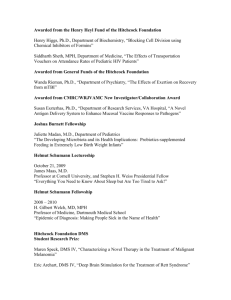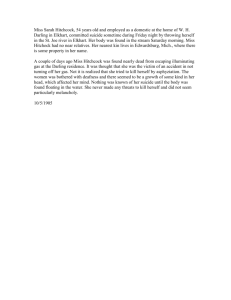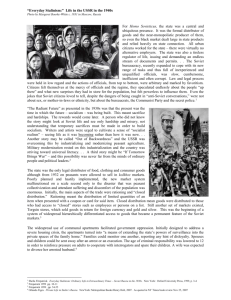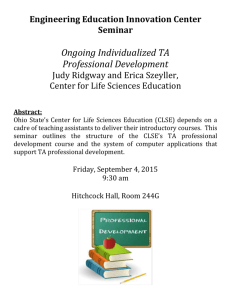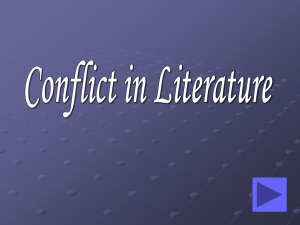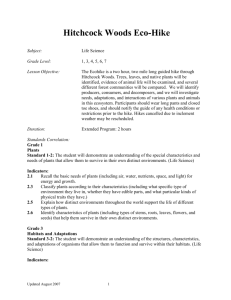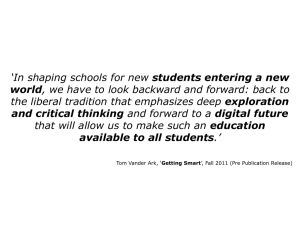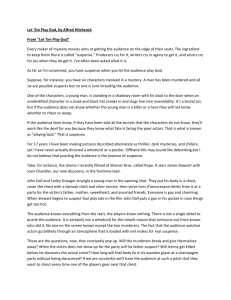Kovaly, Under a Cruel Star, 178-192
advertisement
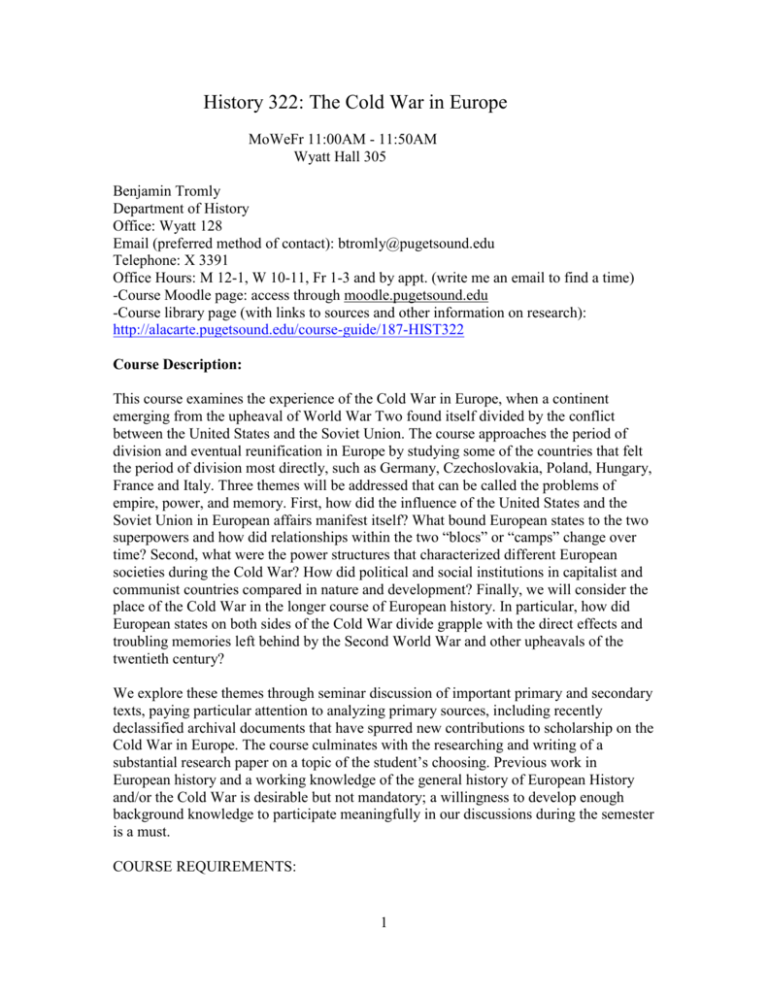
History 322: The Cold War in Europe MoWeFr 11:00AM - 11:50AM Wyatt Hall 305 Benjamin Tromly Department of History Office: Wyatt 128 Email (preferred method of contact): btromly@pugetsound.edu Telephone: X 3391 Office Hours: M 12-1, W 10-11, Fr 1-3 and by appt. (write me an email to find a time) -Course Moodle page: access through moodle.pugetsound.edu -Course library page (with links to sources and other information on research): http://alacarte.pugetsound.edu/course-guide/187-HIST322 Course Description: This course examines the experience of the Cold War in Europe, when a continent emerging from the upheaval of World War Two found itself divided by the conflict between the United States and the Soviet Union. The course approaches the period of division and eventual reunification in Europe by studying some of the countries that felt the period of division most directly, such as Germany, Czechoslovakia, Poland, Hungary, France and Italy. Three themes will be addressed that can be called the problems of empire, power, and memory. First, how did the influence of the United States and the Soviet Union in European affairs manifest itself? What bound European states to the two superpowers and how did relationships within the two “blocs” or “camps” change over time? Second, what were the power structures that characterized different European societies during the Cold War? How did political and social institutions in capitalist and communist countries compared in nature and development? Finally, we will consider the place of the Cold War in the longer course of European history. In particular, how did European states on both sides of the Cold War divide grapple with the direct effects and troubling memories left behind by the Second World War and other upheavals of the twentieth century? We explore these themes through seminar discussion of important primary and secondary texts, paying particular attention to analyzing primary sources, including recently declassified archival documents that have spurred new contributions to scholarship on the Cold War in Europe. The course culminates with the researching and writing of a substantial research paper on a topic of the student’s choosing. Previous work in European history and a working knowledge of the general history of European History and/or the Cold War is desirable but not mandatory; a willingness to develop enough background knowledge to participate meaningfully in our discussions during the semester is a must. COURSE REQUIREMENTS: 1 Participation, 17%: This is a discussion-based class. You are expected to come to class having done the readings for that day and be prepared to offer questions and thoughts about them. Full participation in class discussions—not merely being present—is necessary for a satisfactory grade in the course (see absence policy below). I reserve the right to use in-class quizzes not scheduled in the syllabus to check up on student reading. First analytical paper, 15%: to be based predominantly on class readings to that date; topic to be determined (due Feb 21) Second analytical paper, 18%: similar to first (due March 31) Proposal and bibliography, 4%: instructions to come (due Apr 25) Reading reflection paper, 4% (dates vary): Each student will be assigned a class date (schedule will be provided). On this day, bring a 2 page minimum (doublespaced) paper to class that a) explores some topic of interest to you in the readings assigned for that day and b) poses at least a few questions to the class related to this topic of interest to you. It is hoped that you will use this paper to contribute to our discussion for that day in a particularly active manner (I might call on you to present your findings). The goal of the assignment is twofold: to draw on your own ideas in leading our class sessions, and to give you experience in presenting your work in a classroom setting. Please note that you must be present in class on the appropriate date to complete this assignment. If you absolutely must be absent for excusable reason on that day, tell me in advance so that we can reschedule your paper. Final presentations, 3%: Our final two classes are devoted to presentations on the results of your final paper research. I will divide the class into groups based on compatibility of paper topics. You will be required to meet in your discussion group (I have cancelled a class at the end of the semester to give you time for this). Your task will be to create a brief collective presentation (approximately 10 minutes in length) that will incorporate and synthesize the findings of your individual papers. Then your classmates can ask you questions or otherwise respond to your presentations. Keep in mind that being present and actively posing questions in the last two classes will be highly important for your participation grade. Research paper or thesis prospectus, 26% (May 7): Each student will write a substantial (10 page minimum) term paper due on December 9. You are encouraged to write about a topic of interest to you, so long as it deals with some aspect of European history and the Cold War from 1945-1991 (pending my approval). Your paper may use class materials but it also needs to incorporate significant independent research. I encourage you to write a paper that utilizes primary sources—including, if appropriate, sources that have only recently become available to historians—in order to construct your own point of view on a problem. (There will be a list of some relevant sources and databases placed on the course’s library website and/or moodle page). More detailed instructions to follow. History majors will have the opportunity to write a prospectus for a potential History 400 project in place of the research paper. Instructions will follow. 2 Final exam, 13%: The final will require you to write an in-class essay synthesizing materials from across the semester (on Wed., May 14, 12-2, Wyatt 305) COURSE INFORMATION AND POLICIES: • • • • • • • • • • Attendance at all class meetings is expected. Each unexplained absence is viewed with irritation and dismay and influences your grade; after three absences, your final grade in the course will automatically be lowered by half a letter grade (from B+ to B). If medical or family emergencies prevent you from coming to class, please let me know before or soon after the class. I strongly encourage you to visit me in office hours. There is no need to schedule an appointment during scheduled office hours. If you are unavailable during these times, please contact me in advance by email to schedule a meeting. The best way to reach outside of class is via email. Please check your UPS email account—or a different account you give me—regularly. On occasion, I will send emails to the class to provide you with reading questions and important contextual information. I try to respond to email as quickly as possible, but I cannot promise that I will respond promptly to messages sent on weekends or holidays. The final exam is given only at the scheduled time. Claims for academic accommodation for an individual’s learning disabilities must be directed at the beginning of the semester to Disabilities Services at the Center for Writing, Learning, and Teaching at 253.879.2692. All assignments must be submitted at the start of class on the due date or as otherwise instructed. Papers should be typed, double-spaced, and proofread, with page numbers and parenthetical citations. No need for a works cited list or a bibliography as you will be using course materials in your papers. Please submit papers in hard copy only unless otherwise noted below. All late papers should be sent by email (you are responsible for making sure that you have attached the file and that it reaches me—please cc yourself). Late work will be penalized at the rate of ½ a letter grade per day late (a ‘B’ paper handed in two days late becomes a ‘B-‘) and will not be accepted more than five calendar days following the due date. Please notify me before the paper is due if health or family emergencies prevent you from submitting work. You are strongly encouraged to review UPS’s policies on academic honesty and plagiarism as detailed in the Academic Handbook. Plagiarism will result in a 0 on the assignment in question, with greater penalties possible. Students who want to withdraw from the course should read the rules governing withdrawal grades, which can be found in the student handbook. Emergency Information: Please review university emergency preparedness and response procedures posted at www.pugetsound.edu/emergency/. There is a link on the university home page. Familiarize yourself with hall exit doors and the designated gathering area for your class and laboratory buildings. If building evacuation becomes necessary (e.g., earthquake), meet your instructor at the designated gathering area so she/he can account for your presence. Then wait for further instructions. Do not return to the building or classroom until advised by a university emergency response representative. If confronted by an act of violence, 3 be prepared to make quick decisions to protect your safety. Flee the area by running away from the source of danger if you can safely do so. If this is not possible, shelter in place by securing classroom or lab doors and windows, closing blinds, and turning off room lights. Stay low, away from doors and windows, and as close to the interior hallway walls as possible. Wait for further instructions. GETTING HELP WITH WRITING: Anyone can become a better writer. The UPS Center for Writing and Learning is has a mission to help all students, at whatever level of ability, become better writers. I strongly urge you to take advantage of its services. To make an appointment, call 879-3404, email cwlt@pugetsound.edu, or drop by Howarth 105. GRADING CRITERIA FOR EVALUATING WRITTEN WORK: An “A”-range paper contains a perceptive, original, and compelling central argument which reflects an original perspective. It is clearly written, well-organized into subarguments, and supported by a variety of specific examples drawn from the readings. A “B”-range paper is a solid academic paper which demonstrates a good grasp on the course materials. But a “B” paper might have one or more shortcomings. It might provide a summary of ideas and information drawn directly from readings and discussions without independent thought or synthesis. Or it might give evidence of independent thought yet suffer from unclear and/or unconvincing presentation of an argument, a lack of textual evidence, or be sloppily written. A “C”-range paper shows a decent grasp on the course material but lacks a thorough or accurately defended argument. A paper receiving a grade lower than “C” suffers from more serious shortcomings, such as not responding adequately to the assignment, frequent factual errors, the lack of a cohesive thesis, poor organization, unclear writing, or a combination of these problems. NOTE: We will discuss paper assignments in class in advance of due dates. I am happy to discuss writing assignments before or after you have written them. Although I do not usually read full drafts of papers, I am happy to look at a thesis statement or a section of a paper. COURSE TEXTS: The following titles are available for purchase at the Campus Bookstore and through online services. They are also available on two-hour reserve at Collins Memorial Library. William Hitchcock, The Struggle for Europe: The Turbulent History of a Divided Continent, 1945-2002 (NY: Anchor, 2004). Gale Stokes, ed. From Stalinism to pluralism: a documentary history of Eastern Europe since 1945, 2nd ed. (New York: Oxford University Press, 1996) 4 Heda Kovály, Under a Cruel Star: A Life in Prague, 1941-1968 (New York: Holmes & Meier, 1997) Course reader. SCHEDULE OF CLASSES: Important notes on using this schedule: -All reading assignments are to be completed before the class meeting for which they are listed (for example, come to class on August 31 having read Hitchcock, Thorez, and Kovaly). Please bring to class the syllabus and the assigned readings for the day (and/or reading notes). -I recommend that you do the readings for each day in the order I list them. -Readings from the course reader are marked (CR). -under some class sessions I have listed “PREP” questions. These are merely some questions (not exhaustive, of course) to ponder when doing the reading. You do not need to take them into consideration when writing your response papers unless you want to. Jan 22 W: Introduction to class Jan 24 F: World War Two's effects on Europe: destruction, collaboration, transformation The syllabus Jan T. Gross, "Themes for a Social History of War Experience and Collaboration," in István Deák et al., eds., The Politics of Retribution in Europe: World War II and Its Aftermath, 15-35 (CR) Antony Beevor, "An ugly carnival," The Guardian, Thursday 4 June 2009 (CR) PREP: -What does Gross mean by arguing that war should be analyzed as being “endogenous” (internally originated) to a society? Why might he propose this idea? -What social and economic changes were under way in Central and Eastern Europe during the war? How would these feed into communist rule after the war? -How does Gross treat the concept of “collaboration”? What are the origins of the term? Why might it be difficult to identify who the “true” collaborators were after WWII? Why is the carnival Beevor describes an “ugly” one? Jan 27 M: The end of the war: Central Europe Hitchcock, The Struggle for Europe, 9-18 Heda Margolius Kovály, Under a Cruel Star: A Life in Prague 1941-1968, 39-66 PREP: - Heda Margolius Kovály was a Czechoslovak writer of Jewish origins born in 1919. Her family was deported to the Jewish Ghetto in Lodz, a Polish city then incorporated into Nazi Germany. She was deported to the Auschwitz concentration camp in 1944 and selected to survive as a slave laborer (her parents were killed). She and her husband 5 returned to Prague after it was liberated by the Red Army in May 1945 at the very end of WWII. -What groups of Europeans displaced by WWII were on the move in 1945? How did these movements affect politics and social life? -What does the Kovály readings have to say about the aspirations of different Europeans for the postwar period? How did Kovaly and her husband understand the tragedy they had lived through? Who was to blame? -How does the Kovaly reading present the theme of collaboration? Can we connect the reading to the Gross article? I. From Total War to Cold War Jan 29 W: The history of an awkward alliance John Lewis Gaddis, We Now Know: Rethinking Cold War History, 1-26 (CR) Jan 31 F: The Allies and the Polish question: the first clash (group 1) Hitchcock, The Struggle for Europe, 19-26, 98-107 From Stalinism to Pluralism, 13-18 and 29-30 W. Averell Harriman and Elie Abel, “Special Envoy to Churchill and Stalin,” in The Cold War in Europe (CR) PREP: -Today we examine the very first clash between the Allies that would soon spiral into the Cold War: the installation of a pro-Soviet regime in Poland after the country was liberated by the Red Army. Hitchcock provides context for the complex clash that involved the “London Poles,” that is, the pro-Western and anti-Soviet government in exile as well as the Home Army in Poland tied to it, the Britain and the US, Stalin and pro-Soviet Communist Poles, many of whom were in Moscow during the war. Harriman, a Democratic Party politician and diplomat who was Ambassador to the USSR at the time, gives us a firsthand account of the conflict and a unique glimpse of its central actor: Iosif Stalin. -Why was what Stalin called a “friendly” government in Poland so important to him? Did his treatment of the Poles reflect a justifiable definition of Soviet security needs in the postwar period? What was the position of Harriman on this issue? Was there anything the allies could have done to prevent the imposition of a communist-dominated government? Feb 3 M: The Division of Germany (group 2) Hitchcock, The Struggle for Europe, 26-39 Charles Kindleberger to John K. Galbraith, August 13, 1946 (State Department File, Kindleberger Papers: Truman Archive) (CR) Wolfgang Leonhard, Child of the Revolution, 442-462 (CR) 6 PREP: -Today’s readings deal with the occupation of Germany by the victors of WWII and how the German question contributed to the Cold War. Why did the Western powers and the USSR, erstwhile allies, fall out over the question of determining the shape of postwar Germany? How do Hitchcock and the primary sources depict the core goals of the different powers in ruling their German zones of occupation? -Our first primary source is correspondence on the worsening situation in Western Germany, written by one famous professional economist to another, both of whom served in the State Department in the Office of Economic Security Policy at the time. Kindleberger was an architect of the Marshall Plan. -Wolfgang Leonhard (born 1921) was a German communist who spent much of the 1930s in the Soviet Union (as did many communists fleeing Hitler). His mother was arrested as an “enemy of the people” in the Stalinist terror of the 1930s, as were other foreign communists. During WWII, Leonhard worked for the “National Front for a Free Germany” in the USSR, a group of German expatriates and prisoners of war groomed for leadership after the liberation of Germany in 1945. In the selection we read he recalls serving the Soviet occupation authorities in East Germany soon after liberation. What does this source say about Soviet priorities in occupied Germany? How did Leonhard view Soviet occupation policies? What was the significance of the unity campaign between the KPD and SPD for the division of Germany and the Cold War? Feb 5 W: The division of Europe: Italy (group 3) Hitchcock, The Struggle for Europe, 69-97 Rossana Rossanda, The Comrade from Milan (CR) -To provide some more depth on the Cold War in Western Europe we are examining Italy. Hitchcock provides an overall account of the process by which Italy moved from a country that seemed to be up for grabs in the Cold War (coalition government with communist participation) to clearly belonging in the Western camp. What were the priorities of Stalin in Italy? -Rossandra (born 1924) took part in the Italian resistance and entered the Italian Communist Party at the end of the war. She would become a high-ranking leader in cultural affairs in PCI under Togliatti. How does Rossandra explain the appeal of communism for Italians after the war? How does she depict the agenda and party culture of the PCI during the formative years of the Cold War? Was this a force that needed to be “contained” by the West, as the Americans claimed? Feb 7 Fr: Stalinization in Eastern Europe Hitchcock, The Struggle for Europe, review 98-100, 107-115 Bradley Abrams, "Hope died last: the Czechoslovak road to Stalinism," in Vladimir Tismaneanu, ed., Stalinism Revisited: The Establishment of Communist Regimes in EastCentral Europe (CR) Kovaly, Under a Cruel Star, 67-92 7 PREP: Today’s topic is the “Stalinization” of Eastern Europe, understood as the period when Soviet institutions and policies were enforced on Eastern Europe in connection with the broader division of the continent. Ponder the reasons laid out for why Hungary and Czechoslovakia—countries, unlike Poland, that in the immediate postwar period did not seem to belong inevitably to a Soviet security sphere—became Soviet satellites. How do these countries fit into the question mentioned by Hitchcock on p 99 about the role of East Europeans themselves in driving the process? II. Establishing a bipolar continent Feb 10 M: Stalinism: Czechoslovakia (group 4) Hitchcock, The Struggle for Europe, 115-125 Kovaly, Under a Cruel Star, 92-104, 138-150 PREP: -Our topic of discussion is East European Stalinism, with a focus on state terror against alleged spies and terrorists (many of them honest communists, bureaucrats and other citizens). Kovaly’s husband was arrested in the Slansky case. What were Stalin’s goals in staging show trials of prominent communists like Slansky and Rajk? How, according to Kovaly, did Czechoslovak people respond to the terror? 12 Feb W: The lure of Stalinism: Miłosz and Poland (group 1) Czesław Miłosz, “The Pill of Murti-Bing” and “Ketman,” in The Captive Mind (CR) -Czesław Miłosz (born 1911) was a Polish-Lithuanian poet. He spent WWII in Warsaw under Nazi occupation. He served as the cultural attaché of communist Poland in France before defecting in 1951; he would eventually pursue an academic career in the US. -What was the appeal of communism for intellectuals, according to Miłosz? Why might Soviet-style communism appeal to intellectuals who had just lived through World War Two in particular? Feb 14 F: The Western bloc: economics, politics and integration Hitchcock, The Struggle for Europe, 127-141 Charles Maier, "Hegemony and Autonomy within the Western Alliance," in Melvyn P. Leffler and David S. Painter, eds., Origins of the Cold War: An International History, 154-174 (CR) Feb 17 M: European integration: European perspectives Hitchcock, The Struggle for Europe, 147-155 Documents from The Cold War: A History in Documents and Eyewitness Accounts, ed. Jussi Hanhimäki and Odd Arne Westad, 312-326 (CR) 8 PREP: Feel free to skip the bit on Ostpolitik early on and the document on the Pleven plan. What were the geopolitical conditions under which the European Coal and Steel Community formed? What was the role of the US in early efforts at European integration? Recall Trachtenberg, who talks about the failure of the plan for a European army and the admission of Germany into American-dominated NATO instead in 1955. How is the story of integration in Europe connected to the emergence of security arrangements? Finally, what position did Britain take on integration? Feb 19 W: American "rollback" of communism Hugh Wilford, The Mighty Wurlitzer: How the CIA Played America, chapter 3: Secret Army (CR) Feb 21 Fr: Tromly presents his research (no reading) Paper one due Feb 24 M: The Western bloc: security and cooperation Marc Trachtenberg, "The Nuclearization of NATO and US-West European Relations," in The Cold War in Europe (CR) Feb 26 W: West Germany and the Nazi past (group 4) Hitchcock, The Struggle for Europe, 141-147 Konrad Adenauer, “Democratic Politics and Christian Ideals” (CR) Heinrich Böll on the Psychological Impact of the Economic Miracle (1960) (CR) Feb 28 Fr: Formulating Western ideology in the Cold War Arthur Koestler, The Right to say “No,” in Bricks to Babel: A Selection from 50 Years of His Writings, Chosen and with New Commentary by the Author (CR) Other reading TBD PREP: -The topic today is intellectual life and the Cold War. How did some intellectuals in the West justify using knowledge to “fight” the Cold War? Could intellectuals avoid committing to one side or the other in the great ideological divide of the time? Could one fight the Cold War in the realm of ideas without becoming a mere propagandist or tool of political agendas? -Arthur Koestler was a Hungarian-Austrian writer who left the Communist Party of Germany in the 1930s after becoming disillusioned with communism during the Great Terror. His novel Darkness at Noon is a famous condemnation of Soviet communism. During the Cold War Koestler was a major participant in the Congress for Cultural 9 Freedom, a group of anti-communist intellectuals that turned out to be a front for the CIA. March 3 M: Contending with “Americanization” in Western Europe (group 5) Hitchcock, The Struggle for Europe, 69-77, 156-161 Richard F. Kuisel, “Coca-Cola and the Cold War: The French Face of Americanization, 1948-1953,” French Historical Studies, Vol. 17, No. 1 (Spring, 1991): 96-116 (CR) Jean-Paul Sartre, Americans and Their Myths (CR) -Today we examine the economics and particularly political economics of the period of economic expansion in Western Europe. Hitchcock provides a thorough view of the first topic, in particular on debates about the role of the Marshall Plan on the European postwar boom. The two articles address the politics of these economic relationships. Carew examines the attempt of America to restructure European labor according to its own model or perhaps self-image. How successful were these efforts at “Americanization”? Kuisel provides an account of the French resistance to Coca-Cola. Why was France so resistant to the company’s expansion? What was the outcome of the scandal and what did it mean in terms of the Cold War as a whole? - Jean-Paul Sartre, the great existentialist philosopher, was a prisoner of war who would eventually gravitate into the resistance (his record of resistance is debated). Like many French intellectuals of the period, he was sympathetic to communism but did not join the French Communist Party. How does Sartre depict America and Americanization in Europe? What might be at the roots of his position? III. Crisis and reevaluation March 5 W: The Cold War and de-Colonization (group 2) Hitchcock, The Struggle for Europe, 162-171, 179-192 Primary sources on Britain and Suez Crisis (CR) PREP: Our focus is on the Suez crisis of 1956 and how it reflects the international roles of Britain and France, especially their relationships with the US. Hitchcock provides some broad context on Britain’s dismantling of its overseas colonies after WWII. The primary sources address the domestic political fallout from the Suez misadventure. Bevan was a left-wing Labor politician who had played a major role in building the British welfare state after the war (not to be confused with Ernest Bevin, foreign minister in the late 1940s). How did Bevan criticize the Suez invasion? How was the Suez crisis connected to the Cold War? March 7 Fr: Crises in the Soviet bloc: Hungary and Poland (group 3) Hitchcock, The Struggle for Europe, 193-213 From Stalinism to Pluralism, 81-87 (Nagy) 10 Arthur Rhodes, "Hungary 1956" (CR) PREP: -Why were Poland and Hungary the weak links in the Soviet bloc? Why did Poland manage (barely) to avoid Soviet intervention while Hungary did not and in fact actively sought it out? -The readings in from Stalinism to Pluralism show the critical role of Marxist opposition in the Hungarian revolution (Poland was similar in this regard). How did Nagy (reformist leader who returned to power and led the revolution in 1956) interpret the official ideology of Marxism-Leninism? -What were Khrushchev’s motivations in seeking to put down unrest in the Soviet bloc? What did the other “fraternal” parties think the Soviets should do in Poland and Hungary? March 10 M: The Berlin Crises in focus (no papers) Hitchcock, The Struggle for Europe, 213-220 “New Evidence on the Berlin Crisis 1958-1962,” Cold War International History Project, Bulletin 11 (winter 1998) (CR) IV. Decline and demise of the Bipolar Order March 12 W: De Gaulle's France: transforming the Cold War? (group 5) Hitchcock, The Struggle for Europe, 220-241 “General de Gaulle surveys Europe and the World,” in Nations & Empires: documents on the history of Europe and on its relations with the world since 1648, 329-334 (CR) PREP: -The primary sources shed light on de Gaulle’s vision of France in the world. To what extent was de Gaulle able to challenge US hegemony in the West? Why was this such an important goal for him? What was the place of the EEC--the next phase of European integration after the ECSC—in his thinking? Why was Germany important and what was Adenauer’s interest in the relationship? March 14 Fr: in-class activity TBD No reading assignment March 17 M-21 spring break March 24: No class (other university obligations) March 26 W: 1968 in Western Europe (group 1) Hitchcock, The Struggle for Europe, 247-262 Donald Atwell Zoll, Twentieth Century Political Philosophy, 259-263 (CR) 11 Excerpt from Herbert Marcuse, One-Dimensional Man (CR) March 28 Fr: Reformism and rebellion in the Eastern bloc (group 2) Hitchcock, The Struggle for Europe, 288-293 From Stalinism to Pluralism, 123-131 (Mlynar, Two Thousand Words) Kovaly, Under a Cruel Star, 178-192 March 31 M: class activity to be determined Second paper due April 2 W: Mechanisms of power in the Soviet bloc: the GDR (group 3) Mary Fulbrook, The people’s state: East German Society from Hitler to Honecker, 241249 (“The honeycomb state: The benign and malign diffusion of power”) (CR) Timothy Garton Ash, The File: A Personal History, 5-17, 94-127 (CR) April 4 Fr: Ostpolitik and Détente Hitchcock, The Struggle for Europe, 293-300 Willy Brandt, People and politics: the years 1960-1975, 366-381 (CR) From Stalinism to Pluralism, 156-162 PREP: Today’s overall topic is détente and its German origins. Hitchcock gives a useful overview of the crucial role of FRG in spurring détente. Brandt gives a first-hand account of how he conceived and first sought to implement his Ostpolitik, or relieving of tensions and cooperation between the two Germanies. A few questions: How does Brandt explain his motivations in pursuing a new relationship with the GDR? How does Brandt’s policy connect to broader changes in German identity and nationhood in the period? We have here a detailed account of the very terse initial diplomatic interactions between Brandt and Willi Stoph, head of the GDR state (not party). Why was the GDR so resistant to Brandt’s advances? Looked at differently, why did Brandt ultimately succeed in convincing the GDR leadership (but only post-Ulbricht!) to establish closer relations with FRG? April 7 M: Movements of dissent in the Soviet bloc: human rights (group 4) Hitchcock, The Struggle for Europe, 300-303 From Stalinism to Pluralism, 162-166 Václav Havel’s reminiscences about Charter 77 (CR) Source: http://www.gwu.edu/~nsarchiv/NSAEBB/NSAEBB213/index.htm PREP: Our discussion will focus on dissent movements that used the language of human rights—which the Soviet bloc countries signed off on in the Helsinki Accords—to 12 articulate opposition to communist rule. How did Charter 77 justify its existence? In what way was it oppositional? What was the connection between Charter 77 and culture? April 9 W: session in library (???) April 11 Fr: The breaking point: Poland, 1980-1981 (group 5) Hitchcock, The Struggle for Europe, 303-310 From Stalinism to Pluralism, 194-203 SESSION OF THE CPSU CC POLITBURO, 10 December 1981(CR) PREP: Our topic is the Polish crisis of 1980-1. If you find the reading assignment heavy, but your priority should be Kaliski, Loth, and primary sources--the 7 odd pages of Hitchcock are the lowest priority, as he tells the story quickly. Two major questions: -why did the Soviet bloc begin to unravel in Poland first? What socio-political, cultural, and geopolitical circumstances made Poland the weak link? -Why did the crisis in Poland fail to bring Soviet military intervention as had the crises of 1956 and 1968? April 14 M: Protesting the bomb in the West Hitchcock, The Struggle for Europe, 262-268 Dorothy Nelkin and Michael Pollak, "Ideology as Strategy: The Discourse of the AntiNuclear Movement in France and Germany". Science, Technology and Human Values, 53 (1980): 3-13 (CR) April 16 W: Thatcherism in Britain Hitchcock, The Struggle for Europe, chapter 12 Margaret Thatcher, Speech to Conservative Party Conference,” 10 October 1980 (CR) April 18 Fr: Immigration and the Emergence of the Far Right in Europe Hitchcock, The Struggle for Europe, 410-434 Jean-Marie Le Pen, “The First Horseman of the Apocalypse: International Communism” (CR) Françoise Gaspard, A Small City in France: a Socialist mayor confronts Neofascism, 1-8, 55-81 (CR) April 21 M: Gorbachev Hitchcock, The Struggle for Europe, 347-358 Archie Brown, Seven Years That Changed the World: Perestroika in Perspective. , chapter 9 (CR) 13 PREP: -Gorbachev was a communist apparatchik who was deeply influenced by the reformism of the Khrushchev years. He was disillusioned by the Prague Spring (he studied in the 50s with Mlynar, a leader of the Prague Spring!) and the economic slowdown and political paralysis of the Soviet order since then. What was his vision for Europe and the relationship between the USSR and the satellite states? April 23 W: 1989 and the end of the Cold War Hitchcock, The Struggle for Europe, 358-379 "Communism’s Negotiated Collapse: The Polish Round Table, Ten Years Later: A Conference Held at the University of Michigan, April 7-10, 1999" (excerpts) (CR) Record of Main Content of Conversation Between Mikhail Gorbachev and Members of the Politburo of the Central Committee of the Socialist United Party of Germany" (CR) PREP: Today we will examine the revolutions of 1989 with a particular emphasis on the negotiated revolution in Poland. What drove the Polish Solidarity to cut a deal with representatives of the communist regime? Why did communist reformers agree to undertake a democratic process that removed them from power? -think about how the different revolutions in 1989 were interconnected, in other words, how events in one country (Poland, Hungary) affected the others (GDR, Czechoslovakia). -was the collapse of communism in 1989 imaginable without the reforms of Gorbachev? April 25 Fr: no class: other academic obligations Proposal and bibliography due by email, 5 PM April 28 M: Post-Communism in Eastern Europe Vladimir Tismaneanu, Fantasies of Salvation: Democracy, Nationalism, and Myth in Post-Communist Europe, ix-x, 111-140 (CR) April 30: After the Cold War: Political Institutions and Cultures Hitchcock, The Struggle for Europe, 1-7, 435-464 Paul Krugman, “Can Europe Be Saved?” New York Times Magazine, January 12, 2011 (CR) PREP: When reading Hitchcock’s very clear retelling of European integration, don’t feel that you have to master all the details about the institutions and the specific treaties. The main task is twofold. What were the major and often recurring obstacles to further integration of Europe? And how did the process of “stumbling” towards Europe keep going despite these hurdles? What were the critical moments and circumstances, political and economic that allowed the continent to move closer to today’s EU? Krugman brings us right to 2011 and the crisis confronting the EU today, which is primarily economic in nature but raises fundamental questions about politics and culture 14 too. What is wrong with the Euro according to Krugman? How might his economic analysis of the troubles of the Eurozone cast the story presented in Hitchcock in a different light? What are the four possible paths out of the current economic crisis in Europe? What would be reasons for these solutions to be plausible or not? Does our study of Cold War Europe this semester suggest which direction might seem more likely? May 2 F: meeting with presentation group (come to class) May 5 M: research paper presentations May 7 W: presentations continued Final paper due in class Note: I reserve the right to modify the syllabus as I deem necessary for the success of the course. 15
